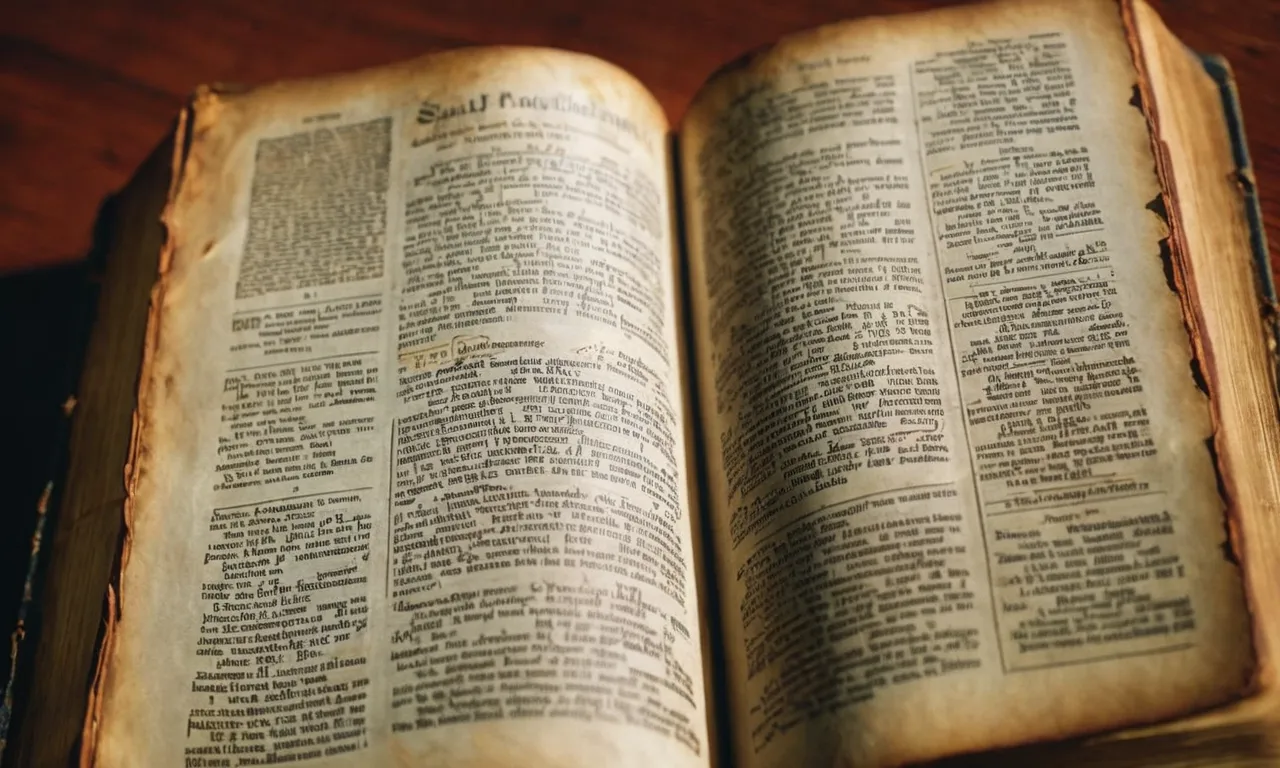Who Is David In The Bible? A Comprehensive Summary
King David is one of the most well-known figures in the Bible. From his unlikely rise from shepherd boy to anointed king, to his tumultuous reign over Israel and his poetic writings, the life of David has inspired believers for generations.
If you’re short on time, here’s a quick answer to your question: David was the second king of Israel and Judah described in the books of Samuel, Kings, and Chronicles in the Old Testament. He killed the Philistine giant Goliath as a youth, served King Saul as a musician and military leader, became king after Saul’s death, and united and ruled over the 12 tribes of Israel, establishing Jerusalem as its capital.
In this comprehensive guide, we will examine David’s origins, his ascent to the throne, his triumphs and controversies as king, his extensive writings found in the Book of Psalms, and his enduring legacy for both Judaism and Christianity.
David’s Early Life and Anointing
Humble origins as youngest son of Jesse
David came from the non-elite family of Jesse from Bethlehem. As the youngest of eight sons, David was responsible for tending his family’s sheep out in the lonely pastures (1 Samuel 16:11). This modest upbringing shaped his character and dependency on God from an early age.
Though David seemed an unlikely candidate for greatness, the prophet Samuel saw David’s inner qualities when anointing him, saying “People look at the outward appearance, but the Lord looks at the heart”
Anointed by Samuel as next king though still a youth
While David was still a teenager, the prophet Samuel privately anointed him to be the next king over Israel (1 Samuel 16:1-13). This was an incredible honor, as David was not even one of his father’s eldest sons.
Yet God looked past David’s young age and outward appearance, recognizing in David a promising leader whose “heart was after God’s own heart” (Acts 13:22).
Rose to prominence by slaying the giant Goliath
David rose from obscurity by bravely facing the Philistine champion named Goliath, whom all in Israel’s army feared. Though just a humble shepherd boy, David stepped up in faith, striking down the intimidating 9-foot tall giant with just a slingshot and stone (1 Samuel 17).
His astonishing victory caused David’s reputation to spread rapidly across Israel as a courageous warrior and leader.
| David’s Age When… | References |
|---|---|
| Anointed as Future King | Likely 15-20 years old (still a “youth”) |
| Killed Goliath | Not specifically stated, but probably still a teenager based on descriptions as a “youth” and “boy” |
Despite David’s youth when called and used by God in mighty ways, he consistently proved himself as an able leader who trusted fully in God rather than outward appearances or credentials alone. David’s lifelong submission to God’s plans from early life onward led him to achieve incredible victories.
David in King Saul’s Service
Became Saul’s armor bearer and harp player to soothe his fits
When David was still a youth, he was brought into King Saul’s court to play the lyre and soothe Saul whenever an evil spirit troubled him (1 Samuel 16:14-23). Saul took a liking to David and made him one of his armor bearers, a high position for someone so young.
As Saul’s attendant, David had the chance to observe how the royal court functioned. David’s musical talent brought him into the king’s inner circle and paved the way for his future leadership roles.
Had great military victories against the Philistines
During David’s service to Saul, the Philistines renewed their attacks on Israel. When the giant Goliath challenged the Israelites to send out a champion, the young David stepped up and defeated him in single combat (1 Samuel 17).
After this legendary victory, David continued to lead armies and win battles against Israel’s enemies, causing his popularity among the people to increase.
According to the website Bible Study Tools, Goliath stood over 9 feet tall, yet David defeated him with just a slingshot and stone, demonstrating complete faith in God’s power to deliver. David’s courage and skill in battle foreshadowed his later prowess as king. The tale of David and Goliath remains an iconic story of triumph against the odds.
Jealousy from Saul led him to be on the run as an outlaw for years
Though David was a loyal servant, his military successes bred jealousy and paranoia in Saul. By 1 Samuel 18, Saul turned against David and tried multiple times to kill him. David was forced to flee and live as a fugitive for many years, gathering a group of outlaws around him in the wilderness (1 Samuel 21–30).
He had to survive constant pursuit while waiting for the chance to regain honor.
According to the website Learn Religions, David chose not to kill Saul when he had opportunities to do so, respecting that Saul was the Lord’s anointed. This period as a hunted outlaw tested David’s character and prepared him to one day properly assume the throne when God saw fit.
David Ascends to the Throne
After the death of Saul and Ish-Bosheth, the path was paved for David to become king. However, it was not without challenges that he ascended to rule over all of Israel.
Became king of Judah after death of Saul and Ish-Bosheth
David first became king over the tribe of Judah around 1010 BC, following Saul’s death at the hands of the Philistines (1 Samuel 31). He established the city of Hebron as his capital and ruled for 7 1⁄2 years.
Meanwhile, Saul’s son Ish-Bosheth was proclaimed king over the rest of the tribes by Saul’s general, Abner. A power struggle ensued, but after the assassination of Ish-Bosheth, the elders of Israel came to David and anointed him king over a united Israel (2 Samuel 2:1-7; 5:1-3).
United the 12 tribes of Israel under his kingship
David was 30 years old when he became king over the united monarchy of Israel. All 12 tribes pledged their loyalty in a covenant indicating their desire to be unified under his rule (2 Samuel 5:3). They recognized that God had anointed David as Saul’s rightful successor.
David’s first act as king was to conquer the fortress of Zion and rename it the City of David (2 Samuel 5:6-10). This key victory paved the way for Israel to become a dominant regional power under David’s command.
Conquered Jerusalem and made it his capital
One of David’s first strategic goals was to unify the kingdom politically and spiritually. Up until this point, the ark of the covenant, which represented God’s presence, had no permanent home. After consulting with his military leaders, David led an assault on Jerusalem, held then by the Jebusites, and conquered it (2 Samuel 5:6-9).
He renamed the city “the City of David” and installed the ark in Jerusalem, thereby establishing it as the religious and administrative capital of the kingdom of Israel (2 Samuel 6). This was one of David’s wisest and most celebrated acts.
David was strategic both politically and militarily in consolidating his rule over Israel. His ascendance to the throne over a unified kingdom set the stage for Israel to enjoy relative regional dominance and prosperity under his 40-year reign.
Most importantly, his sensitivity to God’s leading secured for Israel a faithful administration and vibrant spiritual life centered in Jerusalem.
Triumphs and Troubles of David’s Reign
Expanded the borders of Israel
When David became king, he continued expanding the borders of Israel. According to the Bible (2 Samuel 8), David conquered the Philistines, Moabites, Arameans, Edomites, and Ammonites, bringing them under Israelite control. This allowed Israel to grow into a regional power.
David’s military victories greatly expanded the territory controlled by Israel. Historians estimate that the borders of Israel quadrupled in size during David’s reign, growing from roughly 8,000 to 32,000 square miles. This gave the Israelites access to valuable trade routes and natural resources.
Committed serious sins with Bathsheba and against Uriah
Though David accomplished much good during his reign, he also committed grievous sins. As described in 2 Samuel 11, David saw the wife of Uriah the Hittite (Bathsheba) bathing and was seized with lust for her. He committed adultery with her, resulting in a pregnancy.
To hide his sin, David arranged for Uriah’s death in battle.
David then married Bathsheba, but their first child died as punishment for his transgressions. The prophet Nathan confronted David about his sins (2 Samuel 12), leading him to repentance. However, the damage was already done – David’s credibility and integrity were diminished in the eyes of subjects.
Faced several rebellions from his sons and subjects
David faced numerous rebellions later in his reign from both within his family and among his subjects. His son Absalom conspired against him and led a revolt, forcing David to flee Jerusalem (2 Samuel 15-18).
Though David ultimately prevailed and Absalom was defeated, it marked a painful period of internal strife in Israel.
Later, another son of David named Sheba led a rebellion against him (2 Samuel 20). Additionally, David conducted a census of fighting men in Israel against God’s will, resulting in a plague sent as punishment (2 Samuel 24).
These events showed that David faced significant unrest and opposition during his reign as king.
David’s Writings and Last Years
Penned many Psalms
King David is credited with writing about half of the 150 Psalms in the Bible. The Psalms are filled with poems and hymns that portray the whole range of human emotion from cries for help while suffering, to expressions of great joy and praise for God.
Here are some examples of popular Psalms thought to be written by David:
- Psalm 23 – “The Lord is my shepherd, I shall not want…” This Psalm is an extremely familiar passage that describes God’s loving care and protection over his people.
- Psalm 51 – This is David’s prayer for forgiveness and renewal after his adultery with Bathsheba and ordering the killing of her husband Uriah. It expresses David’s deep remorse and desire to be cleansed and restored.
- Psalms 3, 4, 5, 6, 7, 11, 12, 13, 18, 19, 20, 21, 26, 27, 31, 32, 34, 35, 36, 37, 40, 41, 51, 52, 54, 56, 57, 59, 60, 63, 142 – These Psalms touch on various themes like crying out to God for help, finding refuge in God from enemies, expressing trust in God’s protection, extolling God’s glory seen in creation, thanking God for his love and faithfulness, and asking God for mercy and redemption from sin.
These Psalms have ministered to millions of people over millennia and are considered among the most poignant and vivid expressions of longing for God and God’s presence in times of need. Though composed thousands of years ago, these Psalms seem to articulate the cries of every human heart that seeks meaning and purpose.
Lived to see his son Solomon firmly established as successor
The last years of David’s reign as king of Israel were marked by ensuring an orderly transition of power to his son Solomon. Though David had several sons by different wives, Solomon was chosen by God to be the next king.
The Bible says David reigned as king for 40 years, 7 years ruling from Hebron over Judah, and 33 years over all Israel and Judah from Jerusalem (1 Kings 2:11).
Towards the end of his life, we read about David making preparations for Solomon to succeed him on the throne. When Solomon was born, God spoke through the prophet Nathan that the boy’s name was to be Jedidiah, which means “loved by God” (2 Samuel 12:24-25).
David knew his special standing and anointed Solomon king before David died, to avoid a power vacuum (1 Kings 1:39). The Biblical account narrates David’s public blessing and commissioning of Solomon as the next king in 1 Chronicles 28-29.
David gave Solomon the plans for construction of the magnificent Temple of God in Jerusalem, though David was not allowed to build it because he had been a man of war (1 Chronicles 28). David exhorted Solomon to walk in God’s ways with an undivided heart and passed on treasuries of gold, silver, bronze and other materials he had stored up for building the Temple.
This showed how David did everything he could to ensure his successor and the kingdom prospered after him.
Right before he died, David instructed Solomon on dealing wisely with certain men who had been loyal to David (1 Kings 2). This once again shows David’s wisdom in thinking ahead for a smooth transfer of power.
Solomon took the reins as the next king and finished the Temple his father David had dreamed of and planned for.
David’s Enduring Legacy
Ancestor and archetype for the future Messiah
As the model king of Israel, David set the standard for righteousness and justice that future kings were expected to emulate. His piety and artistic nature served as an inspiration for prophets and priests over generations.
Most significantly, David became the patriarch of the royal lineage that prophecy foretold would one day produce the Messiah – the ultimate redeemer of the Jewish nation.
Christians believe that Jesus Christ fulfilled this prophecy as a descendant of David and rightful heir to his throne. Biblical genealogies trace Jesus’ heritage back to his ancestor Jesse, David’s father.
The New Testament refers to Jesus as “the son of David” on several occasions to emphasize this connection.
Still revered as model king in Israel and inspiration to Jews
The legacy of King David remains strong in modern Israel. Many locations and sites across the country bear his name, from David’s Citadel museum in Jerusalem to major streets in Tel Aviv. Israeli children read about David’s heroism in school and his Psalms continue to feature prominently in Jewish religious services worldwide.
While David was not without his flaws, Jews still regard his narrative arc from humble shepherd to mighty warrior-poet king as an encapsulation of the history and essence of the people of Israel. His fiercely independent spirit, musical artistry, military cunning, and fervent faith are all traits that unite a scattering of tribes into a coherent cultural identity.
Regarded as prophet and central figure by Christians
In addition to recognizing David’s ancestral connection to Jesus, Christians also study his life and writings for spiritual guidance. The Biblical accounts of David’s experiences provide lessons about human nature – our capacity for good and evil, sin and redemption.
Many of David’s Psalms express the deep yearning of the soul for divine love which lies at the heart of Christian theology.
Perhaps more than any other Old Testament personality, David emerges as a complete and complex individual. His queluded rise to power & fall into corruption echoes modern tales of celebrity scandal before culminating in profound repentance.
The depth of David’s poetry unveils a sensitive soul prone to intenge highs and lows. In ways both light and dark, Christians find David’s story intimately relatable.
Conclusion
The story of David has resonated through the ages as that of an underdog hero, deeply flawed but quick to repent, chosen by God for great responsibility. His writings in the Psalms provide timeless expressions of praise, lament, awe, and devotion to God that still inspire people of faith today.
Though centuries have passed since his reign ended, David remains fixed in memory as the warrior poet king of Israel.








